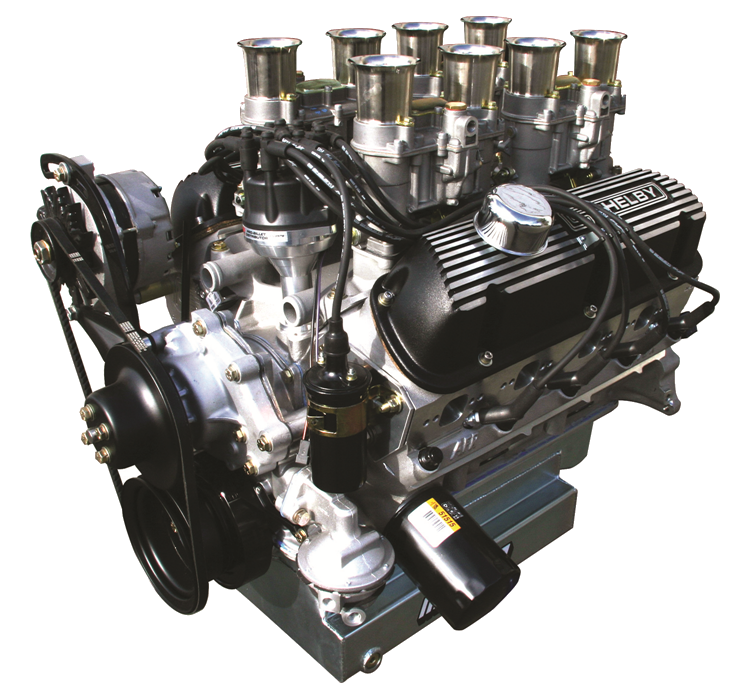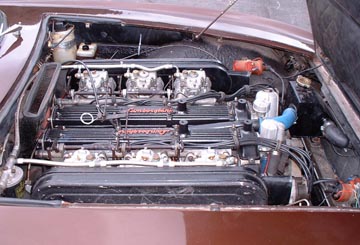
wspohn
SuperDork
2/19/21 12:12 p.m.
I always wondered why Ford opted for a 780 cfm American carb when the Weber 48 IDAs used on the small block Fords in the Cobras offered a theroretical maximum -depending on which venturis were used - of around twice that (not that either engine could ever suck that much) and looked better. Anyone know?
The only indication is that article points to Ford ignorance: "The engine was topped by a prototype Holley 4-barrel carburetor that replaced the temperamental Weber carburetors of its predecessor".
Webers aren't tempermental, and they are dead reliable as any number of Le Mans winners will attest to. They do have a steep learning curve in regard to tuning (many incompetent people trying to tune them have blamed their failures on the carbs) and I suspect that was what dictated the choice of an American 4 bbl carb on the Mk IV but I haven't seen anything in writing that verifies either view.

Italian carbs on a Ford engine, at that time, might not have been acceptable to Hank the deuce.

wspohn
SuperDork
2/21/21 11:03 a.m.
That may very well be the real reason!
Italy bad, America good.
If they ran the Weber's and won, the Italians could say "yeah but they still needed Italian carbs".
Probably best to solve the issues with products you normally use on your cars, more technology transfer that way. Not that that carb is likely to be used on a street legal car of course.
In reply to wspohn :
You know I love Weber's ( and SU's.) but the simple truth is that individual Weber's won't make as much power as 2 four barrel carbs. It's pure physics. Air has mass. Starting and stopping that mass every time a valve opens means only a fixed amount of air/fuel will get into that cylinder. With a big plenum connected to all 8 cylinders air flowing through the carbs won't start and stop. It will be diverted from one cylinder to another depending on firing order but air will constantly be in motion.
If the Webers are plumed the way they normally are though, they will feed on barrel isolated per cylinder. Obviously allows for half the flow of the same carbs on a plenum, but that has to have some advantages (tuning each cylinder is one of course).

wspohn
SuperDork
2/22/21 11:30 a.m.
frenchyd said:
In reply to wspohn :
You know I love Weber's ( and SU's.) but the simple truth is that individual Weber's won't make as much power as 2 four barrel carbs.
Damn - wish they had told the Lamborghini factory that - my engine would have looked far better with a Holley on there......who knew they needed a plenum....

wspohn said:
frenchyd said:
In reply to wspohn :
You know I love Weber's ( and SU's.) but the simple truth is that individual Weber's won't make as much power as 2 four barrel carbs.
Damn - wish they had told the Lamborghini factory that - my engine would have looked far better with a Holley on there......who knew they needed a plenum....

As I've said I love the eye candy of Weber's. It comes from my sprint car days when they had one tube per cylinder. I got involved when Chevy's started to beat Offy's foolishly I thought "Oh they have twice as many tubes so they must make twice as much power" !!!
I mean two carbs on an engine make it faster than 1 carb and 3 is faster than 2. Etc.
Ford could share intake development costs with Holley and not reinvent the wheel. They would in all likelihood get no technical or financial help from Weber.
In reply to Jerry From LA :
Exactly plus there was plenty of knowledge in California about aluminum manifolds. Since a standard hot rod requirement was to replace the stock cast iron manifold with one for bigger carb or more carbs or both.






























